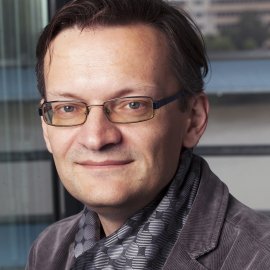Comparative Literature, Russian Academy of Sciences, Russia

Octobre 2015 à Juin 2016
Dmitry TOKAREV is Leading Researcher at the Institute of Russian Literature (Pushkin House) of the Russian Academy of Sciences (Saint Petersburg, Russia). He has a university diploma in Russian language and literature from St. Petersburg State University (1991), a MA and a PhD from the University of Aix-Marseille 1 (“The phenomenon of the literature of the absurd in France and in Russia in the XXth century: Samuel BECKETT and Daniil KHARMS”, 1998), both in comparative literature. In 2006, he defended his habilitation thesis at the Institute of Russian Literature. Dmitry TOKAREV has visited many universities, and was most recently a City of Paris Fellow at the ENS-CNRS laboratory “Cultural transfers”. His scholarly interests include such areas as Russian culture, linguistics, history, art/visual history, philosophy, and critical theory. My special research potential lies in the field of comparative study of Russian and European literatures and interdisciplinary study of visual arts and literature.
"Philosophical Transfers in Interwar France: the HEGELian Seminars delivered by A. KOYRÉ and A. KOJEVE in the Context of French-Russian Intellectual Contacts"
The Heglian seminars delivered by the Russian émigrés Alexandre KOYRÉ (KOYRANSKY) and Alexandre KOJEVE (KOJEVNIKOV) at the Sorbonne and attended (especially in the case of KOJEVE’s legendary Seminar) by a number of influential French intellectuals (MERLEAU-PONTY, ARON, LACAN, CAILLOIS, QUENEAU, BATAILLE, LEIRIS, WEIL) as well as by several eminent Russian personalities (Boris POPLAVSKY, Jacob GORDIN, Raïssa TARR) have never been the subject of a complex analysis within the framework of historical and philosophical research. The central hypothesis is based on the conviction that the perception of HEGEL in the Russian diaspora between the two World Wars had its own peculiarities, manifesting themselves first of all in the mode of selection and representation of the relevant philosophical texts. Moreover, Russians, who were familiar with Hegelian philosophy, often had to make their own difficult choice between two modes of accommodation of this teaching – the one directly connected to Russian religious thought (like in Ivan ILYIN), and the other based on the European secular tradition but at the same time professed by thinkers (KOYRÉ, KOJEVE) who paradoxically owed much to the Russian philosophy. The challenge therefore is to analyze the impact made by the Hegelian philosophy in general and KOYRÉ’s and KOJEVE’s interpretations of HEGEL in particular on the Russian émigrés from a multi-disciplinary perspective (historical, cultural, philosophical and political).
2015. « Les illuminations d’un Rimbaud russe : Boris Poplavsky et son “Journal d’Apollon Bézobrazov” », Revue de littérature comparée, no 1, pp. 29-49.
2015. « La visite de Pierre Drieu la Rochelle à Moscou en 1935 : enjeux politiques, problèmes de traduction », Revue d’histoire littéraire de la France, vol. 115, no 3.
2013. (ed.) « L’exprimable inexprimable » : l’ekphrasis et les problèmes de représentation du visuel dans un texte littéraire, Moscou, Nouvelle revue littéraire.
2011. « Entre l’Inde et Hegel » : l’oeuvre de Boris Poplavsky dans une perspective comparative, Moscou, Nouvelle revue littéraire.
2002. Cap au pire : L’absurde comme catégorie du texte chez Samuel Beckett et Daniil Harms, Moscou, Nouvelle revue littéraire.